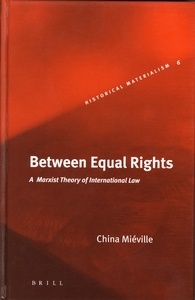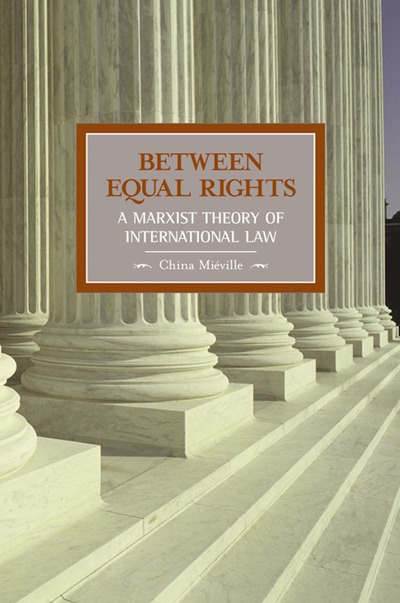China Miéville
This book critically examines existing theories of international law and makes the case for an alternative Marxist approach. China Miéville draws on the pioneering jurisprudence of Evgeny Pashukanis linking law to commodity exchange, and in turn uses international law to make better sense of Pashukanis. Miéville argues that despite its advances, the recent ‘New Stream’ of radical international legal scholarship, like the mainstream it opposes, fails to make sense of the legal form itself. Drawing on Marxist theory and a critical history of international law from the sixteenth century to the present day, Miéville seeks to address that failure, and argues that international law is fundamentally constituted by the violence of imperialism.
Biographical note
China Miéville, Ph.D. (2001) in International Relations, London School of Economics, is an independent researcher and an award-winning novelist. He is a member of the editorial board of Historical Materialism.
Readership
All those interested in Marxism, jurisprudence, critical legal studies, theories of international law and/or the history of international law, as well as international relations theory.
Reviews
“China Miéville has produced an elegant and highly welcome critique of modern international law. His sharp but undogmatic use of Marxist analysis strikes effectively at the implausibility and ideological nature of many of the assumptions that support the application of the rule of law between States. His narrative of the consolidation of international law as part of the capitalist States-system provides a much-needed corrective to standard ‘idealist’ or ‘realist’ histories in the field and his stress on international law’s intrinsic imperialism will challenge the profession for years to come. Respectful of the Marxist classics, Between Equal Rights is the most sophisticated Left critique of international law available today as well as one of the most significant contributions to the theory and history of international law I have read. It raises the debate about law’s role in a globalised world order to a completely new level.”
Martti Koskenniemi, Director of the Erik Castrén Institute of International Law and Human Rights, University of Helsinki.
“China Miéville’s brilliantly original book is an indispensable guide for anyone concerned with international law. It is the most comprehensive scholarly account available of the central theoretical debates about the foundations of international law. It offers a guide for the lay reader into the central texts in the field and it mounts a formidable challenge to experts to address fundamental theoretical issues about the subject which are too often simply ignored. Miéville’s own search for a positive theory of international law takes him into the debates among Soviet legal scholars in the 1920s and in particular to the writings of Evgeny Pashukanis whose seminal works on capitalism and law have been available in English since the 1920s but whose significance for a theory of international law is brought out by Miéville for the first time. Miéville’s insistence that any adequate account of the foundations of contemporary international law must explore its inner connection with the sociology of capitalism is both a novelty in the field and surely the right starting point for a new, much needed debate about this important subject.”
Peter Gowan, Professor of International Relations, London Metropolitan University.
“China Miéville’s new book is unique. At one level, it provides a rigorous introduction to left wing perspectives on the relationship between law and politics, a topic of enduring interest inside and outside the academy. At another level, however, it tells the story of international law and its intellectual development from a Marxist point of view. It is as the latter that Between Equal Rights represents a real oasis in the desert for those of us teaching the law of nations, international relations, or diplomatic history. We have waited a long time for a comprehensive and progressive critique of international law. Miéville proves the wait was worth it.”
Anthony Chase, Professor of Law, Nova Southeastern University Law Center
Table of contents
Introduction
1. ‘The Vanishing Point of Jurisprudence’: International Law in Mainstream Theory
2. Dissident Theories: Critical Legal Studies and Historical Materialism
3. For Pashukanis: An Exposition and Defence of the Commodity-Form Theory of Law
4. Coercion and the Legal Form: Politics, (International) Law and the State
5. States, markets and the Sea: Issues in the History of International Law
6. Imperialism, Sovereingnty and International Law
Conclusion
Appendix A: Pashukanis on International Law
Bibliography
Index


